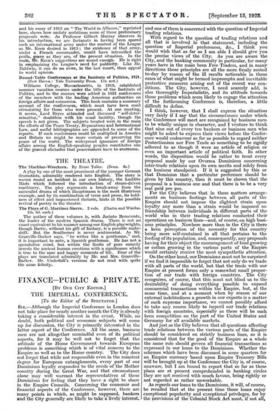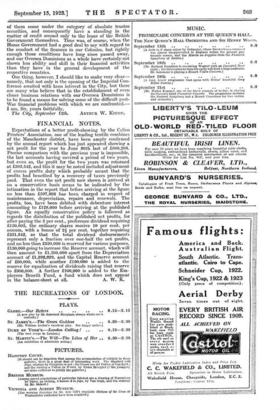FINANCE-PUBLIC & PRIVATE.
[BY OUR CITY EDITOR.]
THE IMPERIAL CONFERENCE.
[To the Editor of the SPECTATOR.] SIR,—Although the Imperial Conference in London does not take place for nearly another month the City is already taking a considerable interest in the event. While, no doubt, both political and economic subjects will come up for discussion, the City is primarily interested in the latter aspect of the Conference. All the same, business men are not altogether unmindful even of its political aspects, for it may be well not to forget that the attitude of the Home Government towards European problems is something which is of vital concern to the Empire as well as to the Home country. The City does not forget that while not responsible even in the remotest degree for European entanglements, every part of our Dominions loyally responded to the needs of the Mother country during the Great War, and that circumstance alone may well warrant the representatives of those Dominions for feeling that they have a right to share in the Empire Councils. Concerning the economic and financial aspects of the Conference, however, there are many points in which, as might be supposed, bankers and the City generally are likely to take a lively interest. and one of them is concerned with the question of Imperial trading relations.
With regard to the question of trading relations and all that is involved in that statement, including the question of Imperial preferences, &c., I think you would wish that as far as I am able I should give you the precise views of the City. As you are aware the City, and the banking community in particular, for many years have in the main been Free Traders, and in many directions those principles are all the more firmly rooted to-day by reason of the ill results noticeable in those cases of what might be termed impromptu and inevitable protective measures arising out of the recent war con- ditions. The City, however, I need scarcely add, is also thoroughly Imperialistic, and its attitude towards those problems which seem likely to engage the attention of the forthcoming Conference is, therefore, a little difficult to define.
I think, however, that I shall express the situation very fairly if I say that the circumstances under which the Conference will meet are recognized by business men to be wholly unique in character, and I venture to think that nine out of every ten bankers or business men who might be asked to express their views before the Confer- ence would endeavour as far as possible to regard neither Protectionism nor Free Trade as something to be rigidly adhered to as though it were an article of religion or even an important article of political faith. In other words, the disposition would be rather to treat every proposal made by our Oversea Dominions concerning inter-trade relations upon its own merits and solely from the business standpoint. If it is suggested by this or that Dominion that a particular preference should be given by this country, then it must be shown that the proposal is a business one and that there is to be a very real quid pro quo. For the City believes that in these matters arrange- ments on business footings between all parts of the Empire should not impose the slightest strain upon loyalty any more than a strain would be imposed on friendship between individuals in different parts of the world who in their trading relations conducted their operations on business lines—and, of course, on high busi- ness principles. Nowhere more than in the City is there a keen perception of the necessity for this country being tiore self-contained in all that pertains to the feeding of its population, and, consequently, any proposals having for their object the encouragement of food growing or cotton growing in the various parts of the Empire would certainly receive the most sympathetic attention. On the other hand, our Dominions must not be surprised if we find it impossible to forget that not only do we trade with all parts of the world, but that the trade with our Empire at present forms only a somewhat small propor- tion of our trade with foreign countries. The City recognizes, of course, that this must not blind us to the desirability of doing everything possible to expand commercial transactions within the Empire, but, at the same time, and at a moment when by reason of our external indebtedness a growth in our exports is a matter of such supreme importance, we cannot possibly afford to take any course likely to imperil our trade relations with foreign countries, especially as there will be such keen competition on the part of the United States and Germany for all available markets.
And just as the City believes that all questions affecting trade relations between the various parts of the Empire should be considered on strictly business lines, so it is considered that for the good of the Empire as a whole the same rule should govern all financial transactions as expressed in our loans to the Dominions. Whether the schemes which have been discussed in some quarters for an Empire currency based upon Empire Treasury Bills will be brought up at the Conference the City is, of course, unaware, but I am bound to report that so far as these plans are at present comprehended in banking circles they are not received with much favour, being rightly or not regarded as rather unworkable.
As regards our loans to the Dominions, it will, of course, be recalled that at the present time those loans enjoy exceptional popularity and exceptional privileges, for by the- urovidons of the Ccilonial Stock Act mogt, if not all of them come under the category of absolute trustee securities, and consequently have a standing in the matter of credit second only to the loans of the British Government themselves. Time was, of course, when the Home Government had a good deal to say with regard to the conduct of the finances in our Colonies, but rightly enough those conditions have long since passed away, and our Oversea Dominions as a whole have certainly not shown less ability and skill in their financial activities than they have in the general development of the respective countries.
One thing, however, I should like to make very clear— namely, that not only is the opening of the Imperial Con- ference awaited with keen interest in the City, but there are many who believe that in the establishment of even closer business relations with our Oversea Dominions is to be found a means for solving some of the difficult post- War financial problems with which we are confronted. I am, Sir, yours faithfully, The City, September 12th. ARTHUR W. KIDDY.



































 Previous page
Previous page